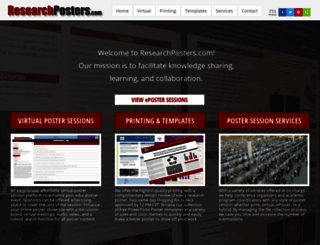ResearchPosters.com – Print, ePoster, and Virtual Poster Sessions
Page Load Speed
3 sec in total
First Response
104 ms
Resources Loaded
2 sec
Page Rendered
931 ms

About Website
Welcome to researchposters.com homepage info - get ready to check Research Posters best content right away, or after learning these important things about researchposters.com
We are the experts in research posters with an engaging virtual poster session platform, quality scientific poster printing, free templates, and unmatched service.
Visit researchposters.comKey Findings
We analyzed Researchposters.com page load time and found that the first response time was 104 ms and then it took 2.9 sec to load all DOM resources and completely render a web page. This is a poor result, as 55% of websites can load faster.